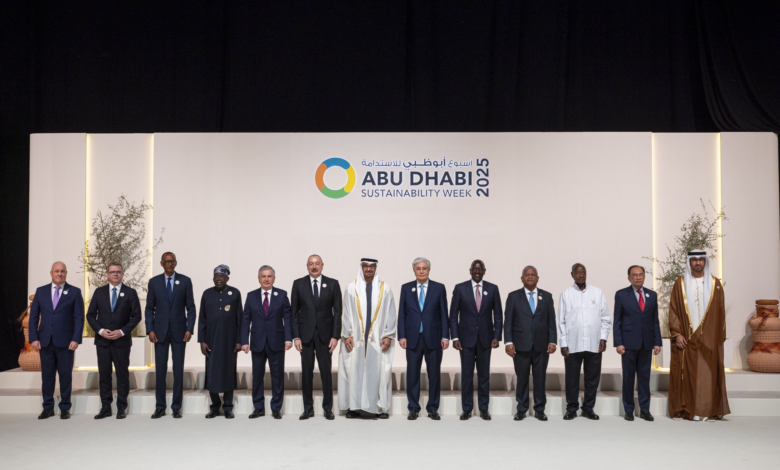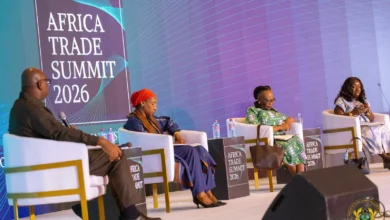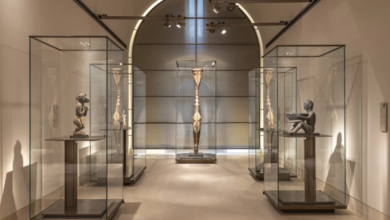Africa-Middle East : a new mutually strategic alliance
In recent months, the Middle East has become the primary donor in Africa, transforming economic and diplomatic relations between these two regions. This influence also extends to diplomacy, as evidenced by Qatar's key role in mediating the crisis between Rwanda and the DR Congo. This partnership offers Africa opportunities for development, job creation, and technology transfer. For the Middle East, these investments strengthen their influence and presence on the continent, while competition between these powers can benefit African nations if they know how to leverage it…

Between 2019 and 2023, the United Arab Emirates (UAE) invested $110 billion in Africa, with $72 billion dedicated to renewable energy, surpassing traditional players such as China, France, and the United Kingdom. At the same time, in October 2024, Saudi Arabia announced a $41 billion commitment over ten years in Sub-Saharan Africa, including $25 billion in direct private investments, $10 billion through the Saudi Export-Import Bank, and $5 billion to support African startups.
Middle Eastern investments in Africa are primarily focused on renewable energy, with the UAE allocating $72 billion to support the continent’s energy transition. In the infrastructure sector, companies like Dubai’s DP World manage several African ports, facilitating trade and strengthening commercial ties. In Zambia, a $1.1 billion investment by International Resource Holdings in Mopani Copper Mines aims to develop the mining sector, while agricultural and telecommunications projects are also supported to modernize agriculture and improve digital connectivity. Priority countries for these investments include Zambia, Guinea, Egypt, Angola, and several Sub-Saharan nations, chosen for their natural resources and economic potential. Among the projects illustrating this cooperation are solar initiatives in Zambia, port infrastructure strengthening in Guinea by Abu Dhabi Ports, the acquisition of Mopani Copper Mines to boost copper production, and agricultural and telecom investments in East and West Africa.
Investments driven by major interests for Middle Eastern countries.
Economic goals: Reducing dependence on hydrocarbons by investing in promising sectors

These massive investments serve several strategic objectives for Middle Eastern countries. First, economic goals. Gulf countries seek to reduce their dependence on hydrocarbons by investing in promising sectors internationally. This ambition is reflected in large-scale projects that redefine exchanges between the two regions. In Egypt, Saudi Arabia, through its Public Investment Fund (PIF), is financing the construction of Neom Green Hydrogen Company, the world’s largest green hydrogen plant, a $8.4 billion project aiming to make the country a major energy hub. In Senegal, the Emirati group AMEA Power recently launched the Kahone solar power plant, which will inject 60 megawatts of electricity into the national grid, supporting the country’s goal of reaching 30% renewable energy by 2030. In Tanzania, the Saudi company ACWA Power is investing in the Julius Nyerere hydropower plant project, with a capacity of 2,115 megawatts, essential to ensuring access to electricity for millions of households. Finally, in the infrastructure sector, Ethiopia signed a strategic agreement with DP World for the development of logistics and transport, thus strengthening the country’s integration into global trade circuits. These initiatives illustrate the Gulf countries’ desire to establish themselves as key partners in African development.
Seizing economic opportunities by focusing on fast-growing markets and abundant natural resources in Africa

Likewise, this interest also aims to seize economic opportunities by capitalizing on rapidly growing markets and abundant natural resources in Africa. Africa indeed offers enormous potential for Middle Eastern countries, particularly in the mining and agricultural sectors. For instance, in the Democratic Republic of Congo, the Emirati company Emirates Global Aluminium invested nearly $1.5 billion in building an alumina refining plant, thus strengthening global supply of strategic metals. This initiative also allows the DRC to diversify its economy, which has been heavily dependent on copper and cobalt mining. In Côte d’Ivoire, Saudi investor Al Habtoor Group injected $500 million into building a cocoa refinery, a key sector for the country, the world’s leading producer of cocoa beans. This project is expected to process 100,000 tons of beans annually, reducing dependence on global markets and increasing the added value of Ivorian cocoa.
In the agricultural sector, the Qatari group Hassad Food invested $200 million in Ethiopia to develop cereal farming and livestock projects, aiming to meet the growing demand for food products in the region. Meanwhile, the Emirati Mubadala Investment Fund signed an $800 million partnership with the Mozambican government for the exploitation and processing of natural resources such as natural gas and coal, with the goal of boosting exports and local industrialization. These projects exemplify the Middle East’s strategy: leveraging Africa’s abundant natural resources to fuel its own economic development while supporting African economies.
Strengthening their geopolitical influence

Finally, as a new power struggle unfolds on the continent, Middle Eastern countries, which are increasing their efforts in this regard, are seeking to strengthen their geopolitical influence. In other words, they aim to enhance their presence and influence in Africa against other global powers, such as China, the United States, or Europe. This dynamic is reflected in strategic investments in key sectors, as well as diplomatic initiatives. For instance, Qatar has played a major role in mediating conflicts, such as the one between Rwanda and the Democratic Republic of Congo, facilitating a peace dialogue in 2025, after previous mediation failures. This action has strengthened Doha’s position as a central diplomatic actor in resolving African crises.
Saudi Arabia, on the other hand, has consolidated its ties with Ethiopia, particularly in infrastructure and security, establishing itself as a key partner in the Horn of Africa, a strategic point for trade exchanges between Asia and Africa. Moreover, the UAE, by strengthening its presence in countries like Somalia and Sudan, has forged solid diplomatic ties, particularly by supporting development projects and providing funding for critical infrastructure. These actions, alongside economic investments, allow Middle Eastern countries to increase their geopolitical influence, assert their weight in political and economic decisions on the continent, and position themselves as essential powers in the African landscape, facing historical actors.
Significant benefits for the continent, economically, socially, and geopolitically
This new partnership between Africa and the Middle East presents significant benefits for the continent, both economically, socially, and geopolitically. Economically, Africa benefits from significant investments in key sectors such as energy, infrastructure, agriculture, and technology. For example, funding for renewable energy in Africa by Gulf countries, particularly solar projects in Egypt or South Africa, helps meet growing electricity needs while reducing dependence on fossil fuels. This support for infrastructure modernization allows Africa to position itself as an attractive hub for international investors, thus stimulating its economic growth.
Socially, these investments create jobs, improve access to electricity, drinking water, and sanitation infrastructure. For example, the green hydrogen plant project in Egypt, funded by Saudi Arabia, will create thousands of direct and indirect jobs, while contributing to the country’s energy transition. Furthermore, collaboration in the educational sector, with scholarships and university partnerships, promotes the skills development of young Africans and strengthens cooperation in training.
Geopolitically, this new relationship between Africa and the Middle East allows the continent to strengthen its position on the global stage, especially as it is increasingly gaining weight in international affairs. The presidency of the African Union at the G20 in 2025, the integration of several African countries into the BRICS, and the launch of the African Continental Free Trade Area (AfCFTA) demonstrate Africa’s ambition to play a central role in global economic and diplomatic decisions. Strengthening ties with the Middle East allows Africa to diversify its partnerships and counter the growing influence of other powers such as China or the United States. These strategic alliances amplify Africa’s voice in international geopolitical discussions while offering the Middle East an opportunity to expand its influence on the continent. In return, Africa benefits from greater autonomy and enhanced means to defend its interests on the global stage.
« These powers are in direct competition to establish themselves as the continent’s main economic partners. This rivalry creates opportunities for African countries… »
Middle Eastern countries such as the UAE, Saudi Arabia, Qatar, and Kuwait are today the main actors in this new dynamic in Africa, with massive investments reflecting their geopolitical ambitions.
Among Middle Eastern countries, the UAE stands out as the primary investor in Africa. Between 2019 and 2023, the UAE invested $110 billion in various projects across the continent, with $72 billion specifically dedicated to renewable energy. These investments also cover sectors such as port infrastructure, with companies like DP World operating six African ports, and the mining sector, as evidenced by the $1.1 billion investment in Zambia for Mopani Copper Mines. In contrast, direct investments from Saudi Arabia and Qatar in Africa, although significant, are lower than those of the UAE. The UAE, for example, invested nearly $72 billion in renewable energy and other sectors, while Saudi Arabia invested funds in major infrastructure and energy projects. That said, Qatar, with its active diplomacy, has also injected billions into strategic projects in Africa, particularly in logistics and infrastructure.
However, these powers are in direct competition to establish themselves as the continent’s main economic partners. This rivalry creates opportunities for African countries, which can leverage this competition by negotiating better deals and multiplying partnerships with various Middle Eastern players. By strategically managing these alliances, Africa could not only enhance its economic development but also increase its geopolitical influence globally.






